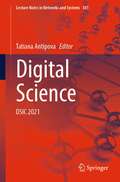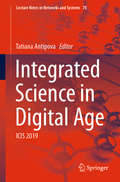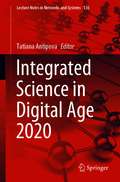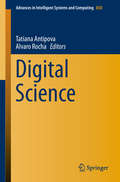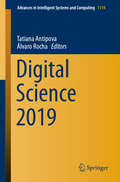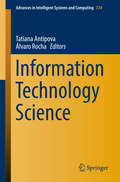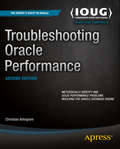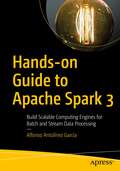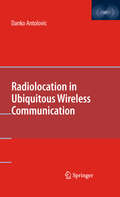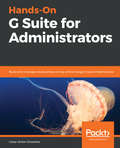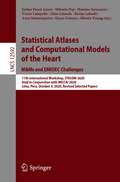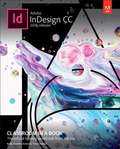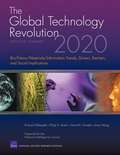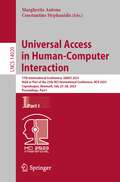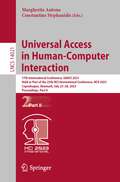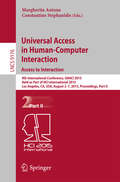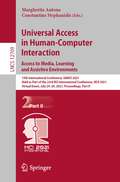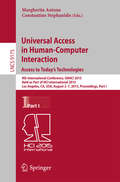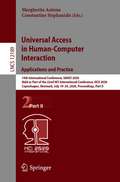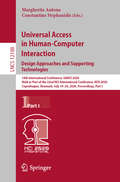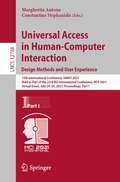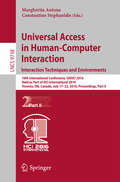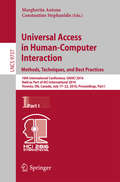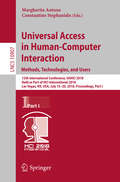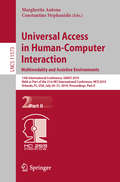- Table View
- List View
Digital Science: DSIC 2021 (Lecture Notes in Networks and Systems #381)
by Tatiana AntipovaThis book gathers selected papers that were submitted to the 2021 International Conference on Digital Science (DSIC 2021) that aims to make available the discussion and the publication of papers on all aspects of single and multidisciplinary research on conference topics. DSIC 2021 was held on October 15–17, 2021. An important characteristic feature of conference is the short publication time and worldwide distribution. Written by respected researchers, the book covers a range of innovative topics related to: digital economics; digital education; digital engineering; digital environmental sciences; digital finance, business and banking; digital health care, hospitals and rehabilitation; digital media; digital medicine, pharma and public health; digital public administration; digital technology and applied sciences. This book may be used for private and professional non-commercial research and classroom use (e.g., sharing the contribution by mail or in hard copy form with research colleagues for their professional non-commercial research and classroom use); for use in presentations or handouts for any level students, researchers, etc.; for the further development of authors’ scientific career (e.g., by citing, and attaching contributions to job or grant application).
Integrated Science in Digital Age: ICIS 2019 (Lecture Notes in Networks and Systems #78)
by Tatiana AntipovaThis book gathers selected papers presented at the 2019 International Conference on Integrated Science in Digital Age (ICIS 2019), which was jointly supported by the Institute of Certified Specialists (ICS), Russia and Springer and held in Batumi, Georgia on May 10–12, 2019. The ICIS 2019 received roughly 50 contributions, by authors hailing from six countries. Following a peer-review process, the Scientific Committee – a multidisciplinary group of 110 experts from 38 countries around the globe – selected roughly 60% for publication. The main topics covered include: Artificial Intelligence Research; Digital Business & Finance; Educational Sciences; Health Management Informatics; Public Administration in the Digital Age; and Social Problem-solving.
Integrated Science in Digital Age 2020 (Lecture Notes in Networks and Systems #136)
by Tatiana AntipovaThis book presents the proceedings of the 2020 International Conference on Integrated Science in Digital Age, which was jointly supported by the Institute of Certified Specialists (Russia) and Springer, and was held on May 1–3, 2020.The conference provided an international forum for researchers and practitioners to present and discuss the latest innovations, trends, results, experiences and concerns in the various areas of integrated science in the digital age. The main goal of the conference was to efficiently disseminate original findings in the natural and social sciences, covering topics such as blockchain & cryptocurrency; computer law & security; digital accounting & auditing; digital business & finance; digital economics; digital education; digital engineering; machine learning; smart cities in the digital age; health policy & management; and information management.
Digital Science (Advances in Intelligent Systems and Computing #850)
by Tatiana Antipova Alvaro RochaThis book gathers the proceedings of the 2018 International Conference on Digital Science (DSIC’18), held in Budva, Montenegro, on October 19 – 21, 2018. DSIC’18 was an international forum for researchers and practitioners to present and discuss the latest innovations, trends, results, experiences and concerns in Digital Science. The main goal of the Conference was to efficiently disseminate original findings in the natural and social sciences, art & the humanities. The contributions address the following topics: Digital Agriculture & Food Technology Digital Art & Humanities Digital Economics Digital Education Digital Engineering Digital Environmental Sciences Digital Finance, Business & Banking Digital Health Care, Hospitals & Rehabilitation Digital Media Digital Medicine, Pharma & Public Health Digital Public Administration Digital Technology & Applied Sciences Digital Virtual Reality
Digital Science 2019: Icis 2019 (Advances in Intelligent Systems and Computing #1114)
by Tatiana Antipova Álvaro RochaThis book presents the proceedings of the 2019 International Conference on Digital Science (DSIC 2019), held in Limassol, Cyprus, on October 11–13, 2019. DSIC 2019 was an international forum for researchers and practitioners to present and discuss the most recent innovations, trends, results, experiences and concerns in digital science. The main goal of the conference was to efficiently disseminate original findings in the natural and social sciences, art & the humanities. The contributions in the book address the following topics: Digital Art & Humanities Digital Economics Digital Education Digital Engineering Digital Finance, Business & Banking Digital Healthcare, Hospitals & Rehabilitation Digital Media Digital Medicine, Pharma & Public Health Digital Public Administration Digital Technology & Applied Sciences Digital Virtual Reality
Information Technology Science (Advances In Intelligent Systems And Computing #724)
by Tatiana Antipova Álvaro RochaThis book includes a selection of articles from the 2017 International Conference on Information Technology Science (MosITS’17), held on December 1-3, 2017, at the Izmailovo Convention Centre, Moscow, Russia.MosITS’17 was an international forum for researchers and practitioners to present and discuss the most recent innovations, trends, results, experiences and concerns in various areas of information technology science.The papers cover topics such as information technology in communication, management science, public administration, economics, business & finance, history, health & rehabilitation, education, and in architecture.
Troubleshooting Oracle Performance
by Christian AntogniniTroubleshooting Oracle Performance, 2nd Edition is your systematic guide to diagnosing and resolving performance problems in database-backed applications involving Oracle's database engine. Christian Antognini brings a decade and a half experience to his topic. His first edition is one of the most well-respected books in its field. This second edition has been rigorously updated to cover the latest developments in Oracle Database 11g Release 2 through Oracle Database 12c. What do you do when your database application isn't running fast enough? You troubleshoot, of course. Finding the slow part of an application is often the easy part of the battle. It's finding a solution that's difficult. Troubleshooting Oracle Performance, 2nd Edition helps by providing a systematic approach to addressing the underlying causes of poor database application performance. The author freely shares his experience while explaining the underlying foundations of how SQL statements are executed by the Oracle database engine. You'll be able to draw a solid foundation of theory and shared experience as you face head-on the performance challenges in your daily work. Written for developers by an application developer who has learned by doing Gives a systematic approach to solving database application performance problems Helps you plan for performance as you would for any other application requirement What you'll learn Systematically identify performance problems Configure the query optimizer to meet performance goals Read and recognize inefficient execution plans Minimize the impact of parsing upon performance Optimize data access, joins, and the physical design of your database Improve performance through parallel processing, materialized views, and result caching Apply SQL tuning techniques such as hints, SQL profiles, stored outlines, and SQL plan baselines Reduce inefficiencies from too much procedural code Who this book is for Troubleshooting Oracle Performance, Second Edition is targeted at application developers and database administrators involved in troubleshooting performance problems in Oracle-based applications. Table of Contents Part I: Foundations 1. Performance Problems 2. Key Concepts Part II: Identification 3. Analysis of Reproducible Problems 4. Real-Time Analysis of Irreproducible Problems 5. Postmortem Analysis of Irreproducible Problems Part III: Query Optimizer 6. Introducing the Query Optimizer 7. System Statistics 8. Object Statistics 9. Configuring the Query Optimizer 10. Execution Plans Part IV: Optimization 11. SQL Tuning Techniques 12. Parsing 13. Optimizing Data Access 14. Optimizing Joins 15. Beyond Data Access and Join Optimization 16. Optimizing the Physical Design Appendix A
Hands-on Guide to Apache Spark 3: Build Scalable Computing Engines for Batch and Stream Data Processing
by Alfonso Antolínez GarcíaThis book explains how to scale Apache Spark 3 to handle massive amounts of data, either via batch or streaming processing. It covers how to use Spark’s structured APIs to perform complex data transformations and analyses you can use to implement end-to-end analytics workflows. This book covers Spark 3's new features, theoretical foundations, and application architecture. The first section introduces the Apache Spark ecosystem as a unified engine for large scale data analytics, and shows you how to run and fine-tune your first application in Spark. The second section centers on batch processing suited to end-of-cycle processing, and data ingestion through files and databases. It explains Spark DataFrame API as well as structured and unstructured data with Apache Spark. The last section deals with scalable, high-throughput, fault-tolerant streaming processing workloads to process real-time data. Here you'll learn about Apache Spark Streaming’s execution model, the architecture of Spark Streaming, monitoring, reporting, and recovering Spark streaming. A full chapter is devoted to future directions for Spark Streaming. With real-world use cases, code snippets, and notebooks hosted on GitHub, this book will give you an understanding of large-scale data analysis concepts--and help you put them to use.Upon completing this book, you will have the knowledge and skills to seamlessly implement large-scale batch and streaming workloads to analyze real-time data streams with Apache Spark.What You Will LearnMaster the concepts of Spark clusters and batch data processingUnderstand data ingestion, transformation, and data storageGain insight into essential stream processing concepts and different streaming architecturesImplement streaming jobs and applications with Spark StreamingWho This Book Is ForData engineers, data analysts, machine learning engineers, Python and R programmers
Radiolocation in Ubiquitous Wireless Communication
by Danko AntolovicThe subject of the book is application of multi-antenna radiolocation to the environment of fast, ubiquitous wireless communication among portable devices. It is a systematic presentation of the author's research and development in the field, within the 802.11b standard, while explaining the general principles and exploring applications to other standards and situations. The purpose is to fill a gap in the current technical literature and present the issues involved in locating mobile wireless network agents, in a single volume, accessible to system designers and other practitioners in the wireless field.
Hands-On G Suite for Administrators: Build and manage any business on top of the Google Cloud infrastructure
by Cesar Anton DorantesEffectively implement and administer business solutions on any scale in a cost-effective way to have a competitive advantage using Gsuite Key Features Enhance administration with Admin console and Google Apps Script Prepare for the G suite certification using the concepts in the book Learn how to use reports to monitor, troubleshoot and optimize G Suite Book Description Hands-On G Suite for Administrators is a comprehensive hands-on guide to G Suite Administration that will prepare you with all you need to know to become a certified G Suite Administrator, ready to handle all the business scales, from a small office to a large enterprise. You will start by learning the main features, tools, and services from G Suite for Business and then, you will explore all it has to offer and the best practices, so you can make the most out of it. We will explore G Suite tools in depth so you and your team get everything you need -combination of tools, settings and practices- to succeed in an intuitive, safe and collaborative way. While learning G Suite tools you will also learn how to use Google Sites and App Maker, to create from your corporate site to internal tools, live reports that seamlessly integrate with live documents, and advanced Google Services. Finally, you will learn how to set up, analyze and enforce Security, Privacy for your business and how to efficiently troubleshoot a wide variety of issues. What you will learn Setting up G Suite for the business account Work with the advanced setup of additional business domains and administrate users in multiple Explore Guite's extensive set of features to cover your team's creation and collaboration needs Setup, manage and analyze your security to prevent, find or fix any security problem in G Suite Manage Mobile devices and integrate with third-party apps Create cloud documents, working alone or collaborating in real time Who this book is for System administrators, cloud administrators, business professionals, and aspirants of G Suite admin certificate wanting to master implementing G Suite tools for various admin tasks and effectively implement the G Suite administration for business
Statistical Atlases and Computational Models of the Heart. M&Ms and EMIDEC Challenges: 11th International Workshop, STACOM 2020, Held in Conjunction with MICCAI 2020, Lima, Peru, October 4, 2020, Revised Selected Papers (Lecture Notes in Computer Science #12592)
by Esther Puyol Anton Mihaela Pop Maxime Sermesant Victor Campello Alain Lalande Karim Lekadir Avan Suinesiaputra Oscar Camara Alistair YoungThis book constitutes the proceedings of the 11th International Workshop on Statistical Atlases and Computational Models of the Heart, STACOM 2020, as well as two challenges: M&Ms - The Multi-Centre, Multi-Vendor, Multi-Disease Segmentation Challenge, and EMIDEC - Automatic Evaluation of Myocardial Infarction from Delayed-Enhancement Cardiac MRI Challenge. The 43 full papers included in this volume were carefully reviewed and selected from 70 submissions. They deal with cardiac imaging and image processing, machine learning applied to cardiac imaging and image analysis, atlas construction, artificial intelligence, statistical modelling of cardiac function across different patient populations, cardiac computational physiology, model customization, atlas based functional analysis, ontological schemata for data and results, integrated functional and structural analyses, as well as the pre-clinical and clinical applicability of these methods.
Adobe Indesign CC Classroom In A Book (2018 Release)
by Kelly Kordes Anton Tina DeJarldClassroom in a Book®, the best-selling series of hands-on software training workbooks, offers what no other book or training program does—an official training series from Adobe Systems Incorporated, developed with the support of Adobe product experts. Adobe InDesign CC Classroom in a Book contains 16 lessons that cover the basics, providing countless tips and techniques to help you become more productive with the program. You can follow the book from start to finish or choose only those lessons that interest you.
The Global Technology Revolution 2020, Executive Summary
by Philip S. Anton Richard Silberglitt Anny Wong David R. HowellIn 2020, areas of particular importance for technology trends will include biotechnology, nanotechnology, materials technology, and information technology. The authors of this report assessed a sample of 29 countries across the spectrum of scientific advancement (low to high) with respect to their ability to acquire and implement 16 key technology applications (e.g., cheap solar energy, rural wireless communications, genetically modified crops).
Universal Access in Human-Computer Interaction: 17th International Conference, UAHCI 2023, Held as Part of the 25th HCI International Conference, HCII 2023, Copenhagen, Denmark, July 23–28, 2023, Proceedings, Part I (Lecture Notes in Computer Science #14020)
by Margherita Antona Constantine StephanidisThis two-volume set constitutes the refereed proceedings of the 17th International Conference on Universal Access in Human-Computer Interaction, UAHCI 2023, held as part of the 25th International Conference, HCI International 2023, in Copenhagen, Denmark, during July 23-28, 2023. The total of 1578 papers and 396 posters included in the HCII 2022 proceedings was carefully reviewed and selected from 7472 submissions. The UAHCI 2023 proceedings were organized in the following topical sections: Part I: Design for All Methods, Tools and Practice; Interaction Techniques, Platforms and Metaphors for Universal Access; Understanding the Universal Access User Experience; and Designing for Children with Autism Spectrum Disorders. Part II: Universal Access to XR; Universal Access to Learning and Education; Assistive Environments and Quality of Life Technologies.
Universal Access in Human-Computer Interaction: 17th International Conference, UAHCI 2023, Held as Part of the 25th HCI International Conference, HCII 2023, Copenhagen, Denmark, July 23–28, 2023, Proceedings, Part II (Lecture Notes in Computer Science #14021)
by Margherita Antona Constantine StephanidisThis two-volume set constitutes the refereed proceedings of the 17th International Conference on Universal Access in Human-Computer Interaction, UAHCI 2023, held as part of the 25th International Conference, HCI International 2023, in Copenhagen, Denmark, during July 23-28, 2023. The total of 1578 papers and 396 posters included in the HCII 2022 proceedings was carefully reviewed and selected from 7472 submissions. The UAHCI 2023 proceedings were organized in the following topical sections: Part I: Design for All Methods, Tools and Practice; Interaction Techniques, Platforms and Metaphors for Universal Access; Understanding the Universal Access User Experience; and Designing for Children with Autism Spectrum Disorders. Part II: Universal Access to XR; Universal Access to Learning and Education; Assistive Environments and Quality of Life Technologies.
Universal Access in Human-Computer Interaction. Access to Interaction
by Margherita Antona Constantine StephanidisThe four LNCS volume set 9175-9178 constitutes the refereed proceedings of the 9th International Conference on Learning and Collaboration Technologies, UAHCI 2015, held as part of the 17th International Conference on Human-Computer Interaction, HCII 2015, in Los Angeles, CA, USA in August 2015, jointly with 15 other thematically similar conferences. The total of 1462 papers and 246 posters presented at the HCII 2015 conferences were carefully reviewed and selected from 4843 submissions. These papers of the four volume set address the following major topics: LNCS 9175, Universal Access in Human-Computer Interaction: Access to today's technologies (Part I), addressing the following major topics: LNCS 9175: Design and evaluation methods and tools for universal access, universal access to the web, universal access to mobile interaction, universal access to information, communication and media. LNCS 9176: Gesture-based interaction, touch-based and haptic Interaction, visual and multisensory experience, sign language technologies and smart and assistive environments LNCS 9177: Universal Access to Education, universal access to health applications and services, games for learning and therapy, and cognitive disabilities and cognitive support and LNCS 9178: Universal access to culture, orientation, navigation and driving, accessible security and voting, universal access to the built environment and ergonomics and universal access.
Universal Access in Human-Computer Interaction. Access to Media, Learning and Assistive Environments: 15th International Conference, UAHCI 2021, Held as Part of the 23rd HCI International Conference, HCII 2021, Virtual Event, July 24–29, 2021, Proceedings, Part II (Lecture Notes in Computer Science #12769)
by Margherita Antona Constantine StephanidisThis two-volume set constitutes the proceedings of the 15th International Conference on Universal Access in Human-Computer Interaction, UAHCI 2021, held as part of the 23rd International Conference, HCI International 2021, held as a virtual event, in July 2021. The total of 1276 papers and 241 posters included in the 36 HCII 2021 proceedings volumes was carefully reviewed and selected from 5222 submissions. UAHCI 2021 includes a total of 84 regular papers; they focus on topics related to universal access methods, techniques and practices, studies on accessibility, design for all, usability, UX and technology acceptance, emotion and behavior recognition for universal access, accessible media, access to learning and education, as well universal access to virtual and intelligent assistive environments.
Universal Access in Human-Computer Interaction. Access to Today's Technologies
by Margherita Antona Constantine StephanidisThe four LNCS volume set 9175-9178 constitutes the refereed proceedings of the 9th International Conference on Learning and Collaboration Technologies, UAHCI 2015, held as part of the 17th International Conference on Human-Computer Interaction, HCII 2015, in Los Angeles, CA, USA in August 2015, jointly with 15 other thematically similar conferences. The total of 1462 papers and 246 posters presented at the HCII 2015 conferences were carefully reviewed and selected from 4843 submissions. These papers of the four volume set address the following major topics: LNCS 9175, Universal Access in Human-Computer Interaction: Access to today's technologies (Part I), addressing the following major topics: LNCS 9175: Design and evaluation methods and tools for universal access, universal access to the web, universal access to mobile interaction, universal access to information, communication and media. LNCS 9176: Gesture-based interaction, touch-based and haptic Interaction, visual and multisensory experience, sign language technologies, and smart and assistive environments LNCS 9177: Universal Access to Education, universal access to health applications and services, games for learning and therapy and cognitive disabilities and cognitive support and LNCS 9178: Universal access to culture, orientation, navigation and driving, accessible security and voting, universal access to the built environment and ergonomics and universal access.
Universal Access in Human-Computer Interaction. Applications and Practice: 14th International Conference, UAHCI 2020, Held as Part of the 22nd HCI International Conference, HCII 2020, Copenhagen, Denmark, July 19–24, 2020, Proceedings, Part II (Lecture Notes in Computer Science #12189)
by Margherita Antona Constantine StephanidisThis two-volume set of LNCS 12188 and 12189 constitutes the refereed proceedings of the 14th International Conference on Universal Access in Human-Computer Interaction, UAHCI 2020, held as part of the 22nd International Conference, HCI International 2020, which took place in Copenhagen, Denmark, in July 2020. The conference was held virtually due to the COVID-19 pandemic. The total of 1439 papers and 238 posters have been accepted for publication in the HCII 2020 proceedings from a total of 6326 submissions. UAHCI 2020 includes a total of 80 regular papers which are organized in topical sections named: Design for All Theory, Methods and Practice; User Interfaces and Interaction Techniques for Universal Access; Web Accessibility; Virtual and Augmented Reality for Universal Access; Robots in Universal Access; Technologies for Autism Spectrum Disorders; Technologies for Deaf Users; Universal Access to Learning and Education; Social Media, Digital Services, Inclusion and Innovation; Intelligent Assistive Environments.
Universal Access in Human-Computer Interaction. Design Approaches and Supporting Technologies: 14th International Conference, UAHCI 2020, Held as Part of the 22nd HCI International Conference, HCII 2020, Copenhagen, Denmark, July 19–24, 2020, Proceedings, Part I (Lecture Notes in Computer Science #12188)
by Margherita Antona Constantine StephanidisThis two-volume set of LNCS 12188 and 12189 constitutes the refereed proceedings of the 14th International Conference on Universal Access in Human-Computer Interaction, UAHCI 2020, held as part of the 22nd International Conference, HCI International 2020, which took place in Copenhagen, Denmark, in July 2020. The conference was held virtually due to the COVID-19 pandemic. The total of 1439 papers and 238 posters have been accepted for publication in the HCII 2020 proceedings from a total of 6326 submissions. UAHCI 2020 includes a total of 80 regular papers which are organized in topical sections named: Design for All Theory, Methods and Practice; User Interfaces and Interaction Techniques for Universal Access; Web Accessibility; Virtual and Augmented Reality for Universal Access; Robots in Universal Access; Technologies for Autism Spectrum Disorders; Technologies for Deaf Users; Universal Access to Learning and Education; Social Media, Digital Services, eInclusion and Innovation; Intelligent Assistive Environments.
Universal Access in Human-Computer Interaction. Design Methods and User Experience: 15th International Conference, UAHCI 2021, Held as Part of the 23rd HCI International Conference, HCII 2021, Virtual Event, July 24–29, 2021, Proceedings, Part I (Lecture Notes in Computer Science #12768)
by Margherita Antona Constantine StephanidisThis two-volume set constitutes the proceedings of the 15th International Conference on Universal Access in Human-Computer Interaction, UAHCI 2021, held as part of the 23rd International Conference, HCI International 2021, held as a virtual event, in July 2021. The total of 1276 papers and 241 posters included in the 36 HCII 2021 proceedings volumes was carefully reviewed and selected from 5222 submissions. UAHCI 2021 includes a total of 84 regular papers; they focus on topics related to universal access methods, techniques and practices, studies on accessibility, design for all, usability, UX and technology acceptance, emotion and behavior recognition for universal access, accessible media, access to learning and education, as well universal access to virtual and intelligent assistive environments.
Universal Access in Human-Computer Interaction. Interaction Techniques and Environments
by Margherita Antona Constantine StephanidisThe three-volume set LNCS 9737-9739 constitutes the refereed proceedings of the 10th International Conference on Universal Access in Human-Computer Interaction, UAHCI 2016, held as part of the 10th International Conference on Human-Computer Interaction, HCII 2016, in Toronto, ON, Canada in July 2016, jointly with 15 other thematically similar conferences. The total of 1287 papers presented at the HCII 2016 conferences were carefully reviewed and selected from 4354 submissions. The papers included in the three UAHCI 2016 volumes address the following major topics: novel approaches to accessibility; design for all and eInclusion best practices; universal access in architecture and product design; personal and collective informatics in universal access; eye-tracking in universal access; multimodal and natural interaction for universal access; universal access to mobile interaction; virtual reality, 3D and universal access; intelligent and assistive environments; universal access to education and learning; technologies for ASD and cognitive disabilities; design for healthy aging and rehabilitation; universal access to media and games; and universal access to mobility and automotive.
Universal Access in Human-Computer Interaction. Methods, Techniques, and Best Practices
by Margherita Antona Constantine StephanidisThe three-volume set LNCS 9737-9739 constitutes the refereed proceedings of the 10th International Conference on Universal Access in Human-Computer Interaction, UAHCI 2016, held as part of the 10th International Conference on Human-Computer Interaction, HCII 2016, in Toronto, ON, Canada in July 2016, jointly with 15 other thematically similar conferences. The total of 1287 papers presented at the HCII 2016 conferences were carefully reviewed and selected from 4354 submissions. The papers included in the three UAHCI 2016 volumes address the following major topics: novel approaches to accessibility; design for all and eInclusion best practices; universal access in architecture and product design; personal and collective informatics in universal access; eye-tracking in universal access; multimodal and natural interaction for universal access; universal access to mobile interaction; virtual reality, 3D and universal access; intelligent and assistive environments; universal access to education and learning; technologies for ASD and cognitive disabilities; design for healthy aging and rehabilitation; universal access to media and games; and universal access to mobility and automotive.
Universal Access in Human-Computer Interaction. Methods, Technologies, and Users: 12th International Conference, UAHCI 2018, Held as Part of HCI International 2018, Las Vegas, NV, USA, July 15-20, 2018, Proceedings, Part I (Lecture Notes in Computer Science #10907)
by Margherita Antona Constantine StephanidisThis two-volume set LNCS 10907 and 10908 constitutes the refereed proceedings of the 12th International Conference on Universal Access in Human-Computer Interaction, UAHCI 2018, held as part of HCI International 2018 in Las Vegas, NV, USA, in July 2018.The total of 1170 papers and 195 posters included in the 30 HCII 2018 proceedings volumes was carefully reviewed and selected from 4373 submissions.The 49 papers presented in this volume were organized in topical sections named: design for all, accessibility and usability; alternative I/O techniques, multimodality and adaptation; non-visual interaction; and designing for cognitive disabilities.
Universal Access in Human-Computer Interaction. Multimodality and Assistive Environments: 13th International Conference, UAHCI 2019, Held as Part of the 21st HCI International Conference, HCII 2019, Orlando, FL, USA, July 26–31, 2019, Proceedings, Part II (Lecture Notes in Computer Science #11573)
by Margherita Antona Constantine StephanidisThis two-volume set constitutes the proceedings of the 13th International Conference on Universal Access in Human-Computer Interaction, UAHCI 2019, held as part of the 21st International Conference, HCI International 2019, which took place in Orlando, FL, USA, in July 2019.The total of 1274 papers and 209 posters included in the 35 HCII 2019 proceedings volumes was carefully reviewed and selected from 5029 submissions.UAHCI 2019 includes a total of 95 regular papers; they were organized in topical sections named: universal access theory, methods and tools; novel approaches to accessibility; universal access to learning and education; virtual and augmented reality in universal access; cognitive and learning disabilities; multimodal interaction; and assistive environments.
